Nobody Speaks To the Captain No More
Today, I learned Jimmy Buffett died.
I said a long time ago that Jimmy Buffett’s death was going to mess me up, and I thought that was said in earnest. Jimmy Buffett, if you’re not familiar, is was an American singer-songwriter from Mobile, Alabama, renowned for his involvement in and then kind of codifying the musical genre known as gulf and western. The sound, as I someone who just listens to it a lot, had a lot in common with country music in terms of its production style – there’s not a lot of distortion, instruments tend towards the acoustic rather than the electric, and you usually have a single vocalist, who’s often the author of the song presenting music that’s about a personal experience, in a kind of storytelling way. On the other hand, the association with the Gulf of Mexico meant that the musical instruments are influenced more by, well
Uh
Black people?
Kettle drums, hymnal organs, a range of percussion instruments that I don’t know by name, that kind of thing? Things you’d hear in the Caribbean, and that’s not to simplify the many different musical styles in the gulf, but to indicate the things that Gulf and Western picked up from it.
I wrote about Jimmy Buffett’s music, as expressed in the albums my dad had when I was a kid, across a few years. Between that and my other online statements about the inevitable impact of his death, I had three people approach me about The Bad News, and what that meant, and to check if I was okay. It made sense to me – after all, I’d said that would happen, right?
But I’m okay?
At least right now, as far as I know.
Weird.
Continue Reading →A Software Pirate Looks at 40
There’s this song.
Story Pile: Coconut Telegraph
Sure, we’re bumping at the edges of the month, but trust me: There’s no Jimmy Buffett album that’s got anything fun to say on Pride Month. And this is going to be the last of our Boats to Build articles – at least unless I really regret it and extend my examination one extra album, for later.
The albums of Jimmy’s I listened to were the albums my dad’s music collection; the records he owned, on vinyl, and when we moved and I grew up, they were just there. In the church environment, dad couldn’t readily add music to his collection – certainly not vinyl, with his new fangled, impressive CD player that lived in the corner of the living room like a big black box of impressive technical doom.
I try not to think too much about it. Dad didn’t buy more Jimmy Buffet albums after this one – and this album landed smack between my sister’s birth, and mine. It might be that dad felt there was a massive dip between this album and the next… or maybe, being a father of two and looking for work that could support that while trying to contribute to church meant that these were the first costs that got cut.
In a way this selection of albums that all predate my birth but were endlessly replayed as I grew up are part of the foundation of who I am, a reminder that no matter how millenial I am, I’m grappling with being a product of cultures of lies that give me conflicting, meaningless insights into who they think people can be. It’s up to me to pull these pieces together – or discarding them! – and seeing what I can find.
This album has both one of my favourite Jimmy songs, and one of my least liked Jimmy songs.

Story Pile: Volcano
Volcano is from 1979, one year after Son of a Son, and while it still has that gulfy musical style Jimmy likes, and a real beachy theme and sound to it, it’s an album that’s showing perhaps some of the signs of touring. It has two of Jimmy’s ‘big 8’ songs – songs that get played at every concert – and one of them’s pretty good!
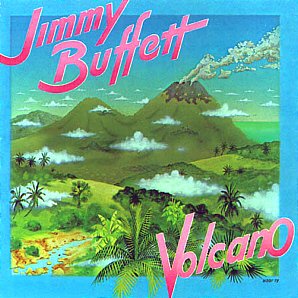
Story Pile: Son of a Son of a Sailor
The followup to Margaritaville And Some Other Songs was, to me, one half of a two-disc set that my dad got and taped so we could listen to it in the car. It’s a very literal album – some very clear, explicit stories told in song form, not a lot of subtle metaphor. This album, while definitely Another Jimmy Buffett Album and having a song or two on it I really like, is relatively brainless.
It’s got a song about liking cheeseburgers, a song about liking parties, another song about liking parties, and two songs about people he’s met, with a restful, relaxing pace to them. These are to me, the better songs on the album – Cowboy in the Jungle and African Friend are both songs that talk about other, interesting people, and their stories as Jimmy’s narrator only momentarily intersected with them.
It’s interesting, and infamously, Cheeseburger in Paradise is a weird classic of his, a song about… liking a cheeseburger.
Anywayyyy, uh
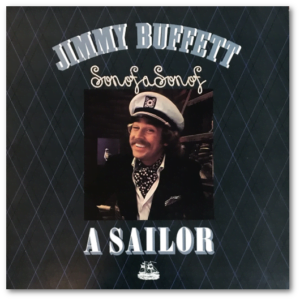
Story Pile: Changes in Latitudes, Changes in Attitudes
Now, look, odds are good listening to this music – if you have been – you may have found you like a few Jimmy songs. You might think that one or two of them are good, maybe the best songs on an album are worth sitting through. That’s fine. I don’t know why I respond to these songs the way I do. If you listen to this album and think ‘eh,’ that’s fine, but you should know that I play a game with this album with people where you take an album and ask how many songs you have to remove before the album’s not worth picking up.
On this ten song album, I think that you have to ditch nine of the songs for me to think it’s not worth getting, and the tenth song that remains is literally his most successful song.
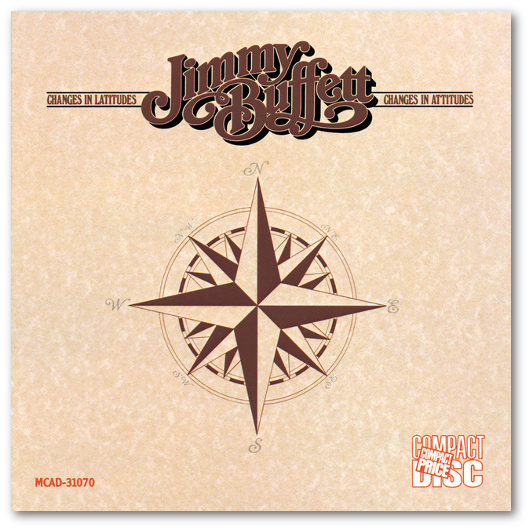
This is the album that catapulted Jimmy briefly into the position of being an FM radio indie kinda guy that had fans but no presence to being what some people would later refer to as a one hit wonder in the country scene. And it’s kind of understandable – Margaritaville is an absolutely titanic hit compared to his normal songs. The song had cross-board appeal, getting to #8 on Billboard, and #13 on Country, which while not unheard of was certainly impressive. This song is not just a classic of the genre but it’s one that kind of became a cultural touchstone for people who went on to become country stars themselves – lots of people reference Margaritaville either by name or by using key phrases, and it’s a song that’s been covered a lot.
There are a few ‘canon’ versions of Margaritaville too, a radio play that’s slightly faster and structured differently, live versions that add different specific references, a kids version Jimmy recorded so his kid could sing along (she’s forty now, mind you). It’s also parodied a lot, with the most well known probably being ‘Marijuanaville,’ a song that is about as clever or subtle as you may think based on the name.
The song’s remarkable to the Jimmy Buffett fandom in that the song is actually a really sad, miserable reflection on how this guy is sad over a breakup and is just drinking himself unconscious repeatedly, whiling away empty days, and at the very end of the song, comes face to face with the fact his situation is his to own and he’s why it sucks. It is sung upbeat and happy and people sing along with it at concerts, and it gives the name to Jimmy’s restaurant chain, suggesting that he’s advertising a great place to go when you’ve destroyed your relationship and end the night being mopped into a bucket.
It also kinda sucks?
I don’t know if this is the Jimmy Buffett hipster equivalent of complaining about overplay, but Margaritaville is to my mind the worst song on this whole album!
This album definitely has more of your 1970s Gulf-And-Western style; songs about being in Mexico or coastal towns, songs about reflection in these spaces where nothing is making demands of you. Where Margaritaville is about a dude wasting his life, Biloxi is a haunting, sunsoaked meditation on a beautiful place, of innocent actions, of the swelling feeling of being in a place that does not hurt. Where Margaritaville is the gentle easygoing rhythm of getting hammered on endless sunsoaked afternoons that don’t matter, Lovely Cruise sings about that with an actual admission of joy, not sadness.
Then there’s In the Shelter, which is already excellent and I kinda covered already, and Landfall.
Now, look, Landfall is a stompy, piano-and-harmonica dance-hall country song that wants to be shouted as much as it wants to be song. It’s got some weird, time-lost joke references (Lucille Ball? Really? Okay, Jimmy), but what sticks with me, the phrase that I realise has been informing my mind for a long time, is where he talks about how being cooped up in a truck doesn’t bother him, being in confined spaces doesn’t bother him, but having to deal with people for prolonged periods bothers him. Running away to the ocean and ignoring people isn’t by any means a thing that scares him, it’s release.
And yeah, I like how singable it is.
I love this album. I’m not sure it’s ‘the best’ Jimmy Album – I put lots of value on West Nashville Grand Ballroom Gown, and Landfall doesn’t have the same potency.
And Margaritaville isn’t that good.
Story Pile: Havana Daydreamin’
I haven’t tried to hammer these Jimmy Buffett albums around the themes of the months as they come up. They’re just going to happen as they happen and things can move and adjust around them, whatever.
Still, this is an album with a bit of a theme that fits the mangled, strange ways I wound up approaching romance, and thankfully, I like to think it did some good, following on the heels of Come Monday from earlier.
When I first found Havana Daydreamin’ it was a busted, tan coloured tape that had been living in dad’s car, a place I didn’t spend any time hanging around until later in my life when I wanted to hide from the evening of loneliness that was church. I was cleaning dad’s car for a dollar, and I found this, in his tape collection. For that reason it’s always felt older to me, like this is somehow primal Jimmy, that this is Jimmy Buffett from before all the other, ‘better’ songs I knew.
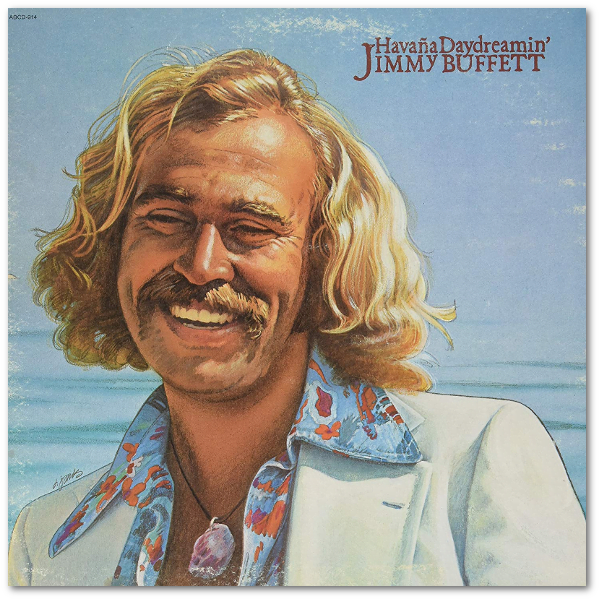
The elephant in the room of this album is The Captain and the Kid, a song Jimmy Buffett ostensibly wrote about his grandfather, a sea captain who talked to him and helped him grow up and taught him things and then, as people are want to do, died. Remember that at this point I’m a cultist, I think that people who die are going to hell if they’re not going to basically our church, and so the mourning sadness of this man missing his grandfather stabbed me.
The song is great. It’s sad and it’s serious and it’s that Jimmy Buffet nostalgia turned to a deeper kind of sadness than just ‘hey, things from when I was a kid are gone.’ It’s beautiful and it made me reflect on how my grandfathers both died before I was born. I remembered actually resenting my life for that – that maybe if there were other men in my life than my father maybe I could learn useful things, maybe I could feel less afraid all the time.
There’s some real tour music, too – Kick it in Second Wind is an absolute coke binge of a song, This Motel Room and Big Rig are all just life-on-the-road story songs, and they’re fine. I actually ran a motel for a while and I remember always hearing This Motel Room as I went about my job, that and Vacancy by Harry Chapin. Which, uh, that song is also great, in a different way.
There are a few more story songs here than I normally expect out of Jimmy Buffett albums. You have songs like Woman Goin’ Crazy on Caroline Street, Havana Daydreamin’, Cliches, and Something So Feminine About A Mandolin and they’re all pretty good, salted with varying degrees of the Jimmy Buffett template of lots of alcohol and or drugs. Of them, I do prefer Cliches, which tells the story of two people who are definitely a pair of kombi-van hippies and how they’re happy and having fun with their lives anyway. What I love about this song I think, these days, is how it’s so incredibly of its time. The couple in this song are now absolutely a pair of stoner grandparents who never officially got married and still live in that trailer.
That’s the thing that I think stuck with me the most about this. There are some people here who aren’t very original. They’re not very remarkable. But they’re together and they like one another and they didn’t need their love to be agonising or astounding. They’re just happy.
Is there anything on this album to compare to He Went to Paris or West Nashville Grand Ballroom Gown? No. But it’s a fun album full of low-key crime and a lot more drugs and fun than A-1-A and it’s got a lot more energy when it bothers to wake up.
Story Pile: A1A
Alright, so Jimmy Buffett’s supposedly discovered his Gulf-And-Western sound. We’ve had the mournful, serious songs that would have blown the doors off if someone ‘properly country’ had done them. Jimmy is now firmly established in something like four years as someone who’s clearly from Alabama, producing music in the south, and isn’t properly Rock to get on the radio that wants that in the 1970s. The lore is that he didn’t get much radio play at all at this point (and it was a point of contention he’d continue to bust on in his 70s albums). We already covered some of that last time, with Saxaphones basically being a whine about it, but it’ll continue here.
What came out next was an album which continues this same mix of different ideas. Rather than hammering on a single idea, or developing deep on this musical style, we get A-1-A, an album that feels like a greatest hits album for a guy who’d only been releasing albums for four years.
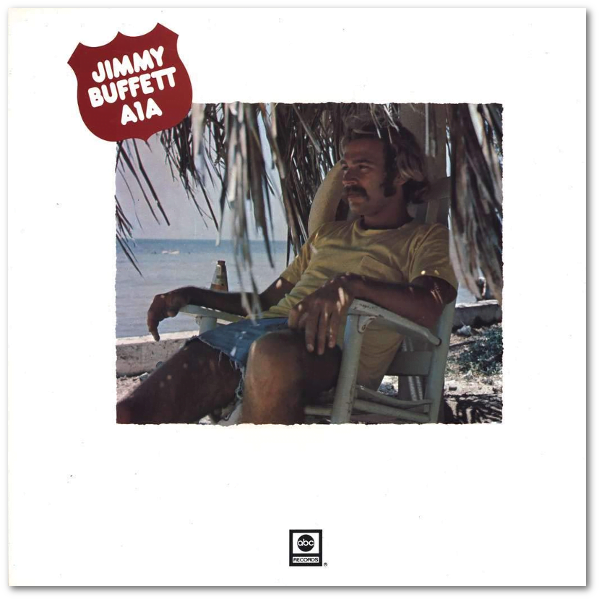
The album opens with such a riff. It’s funny to think this is what country used to be like, or at least, this is close enough to country to be throwing rocks. It’s funny because while I can definitely see some of that jangly, almost jug-band like musical feel to it, the opening song Makin’ Music For Money is sure a statement. This is one of the things about Jimmy Buffett as a singular creator that I really noticed growing up: he was definitely writing about what was on his mind at the time.
Some of his songs are kind of just generic love songs, using the june-moon-spoon formulas of music industry stuff. They’re not bad, but they’re so rarely a fave, often these meandering slow-swing songs that kind of want to hang out with You, Baby, Girl. But when he was writing about what he cared about you got these interesting statements of purpose like Makin’ Music For Money, the maudlin reflection of Stories We Could Tell and the too-too relatable A Pirate Looks At Forty. When this album came out, he was twenty eight, writing about a hypothetical future time when he would face down his own place in history, as he got older.
It’s a really lurching feeling, as this young man writes about how he’s going to get old, about how he doesn’t feel he belongs to his time (which, you know, lots of young people feel). It’s sad, and it’s a song that I remember hearing, the first time, around the time my dad turned forty. I was about five.
I remember there was something really mournful about it, and I had no idea what it was. I didn’t get it. I certainly didn’t get why my dad was so taken with this song about sleeping with younger women, committing piracy, and doing drugs (which I also didn’t understand).
Stories We Could Tell is one of those songs that really feels like it belongs to other, serious country singers too, guys who sing songs rhapsodically praising the work of men who died before he was born. It’s reverent, which maybe Jimmy was doing to try and get Nashville to like him. It’s not his song, and it’s been covered a few times (including by Kasey Chambers and holy shit I want to find that), but it feels so perfectly tuned to have been covered by – well, honestly, by Alan Jackson, fitting in alongside songs like Midnight In Montgomery. But then, if Jackson had covered it I’d have seen it as an entirely artificial attempt to borrow seriousness from better artists, because I don’t think much of Alan Jackson.
It also has Life Is Just A Tire Swing, which is a retrospective song about childhood and growing up and almost dying in a car crash. I remembered in that song that I ruminated on how my life, as a little kid, was probably just like this one, except I didn’t have any friends to hang out with and we didn’t go camping and we didn’t have fun and I knew I could hurt things. I assumed the narrator in the song got beaten up regularly. I realise in hindsight how weird it was but I assumed everyone relating stories about their childhood had stories they just didn’t mention about getting pinned down and stomped on.
The basic ideas of Jimmy Buffett albums are all here. Talking about the sea, startlingly specific references to what he was enjoying at the time, retrospective mourning a lost past, and convenient alcoholism. Migration is a song that’s basically impenetrable to me as an adult, but it had an upbeat rhyhthm to it and it talked about a swearing parrot so I listened to it a lot. When I was asked a few years ago about songs by Jimmy Buffett off this album that mattered to me, I did name Migration (and a song of another album, but anyway), because… I remembered liking how upbeat it was.
I do have a favourite song off this album, though, Nautical Wheelers, and it’s probably for the silliest reason. See, this song has a tempo change in it.
It has probably the first tempo change I ever noticed.
It’s a simple song, with a waltz of a chorus. It doesn’t carry a lot to it. It’s positively G-rated for a song about getting drunk, staying up late, and having a party where you dance with people underinspected.
I was raised to hold on to a Bible verse: I have learned in whatsoever state I am, therewith to be content. It was the idea that you could just be happy being, and we did all sorts of hoop jumping, all sorts of nonsense to justify the way we made ourselves so intensely miserable while we claimed we were all joyful in the LORD. In all my time at church I never saw anyone, anyone who was ever content.
And this song about nothing much was my first vision of the idea of some people who were happy being unremarkably okay.
So, the Album is fine, it’s not got any of my all-star favourites, but it’s still got a lot of Extremely Important moments from my formative little mush-brain growing up. I still realise there’s some of the creative coda in Making Music For Money in my mind, where I realise making is more important to me than success at making. There’s still shards of the fatalism of passing forty. There’s still images of an old guitar haunted by the person who played it last. Is it a best album? Nah. It has to, after all, measure up to its nearest neighbours, which doesn’t do the album any favours.
Story Pile: Living and Dying in 3/4 Time
Aw hell yes.
Okay, so we have an established formula for Jimmy Buffett albums at this point; he basically has three dials of ‘nostalgia,’ ‘chill,’ and ‘alcoholism,’ and there’s an occasional dash of whatever it is he’s thinking of exactly right now. After Pink Sports Coat we get Living and Dying in 3/4 Time, which was where I learned what a time signature was.
Fifteen years after I first heard the album.
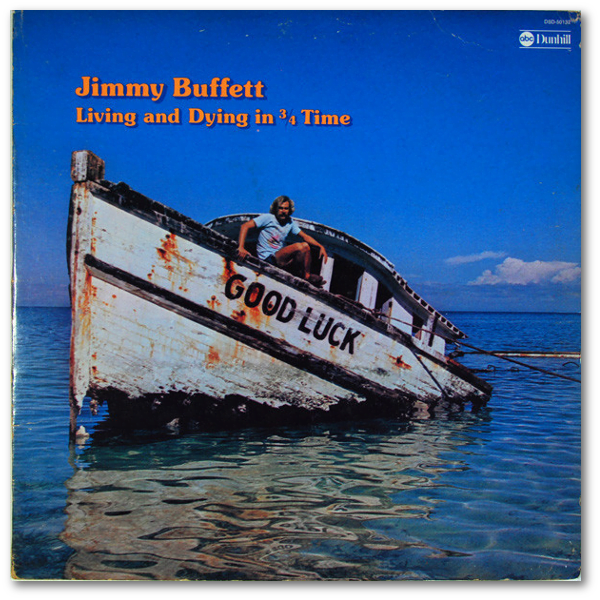
First up, this album had some mainstream pop success with Pencil Thin Mustache and Come Monday, songs that served up the nostalgia and schmoop in pretty solid measures. Pencil Thin Mustache is especially funny to listen to when you remember it’s a dude in his mid-twenties talking about feeling old, making the whole affair feel artificial now in hindsight even if my whole life, Jimmy Buffett’s been the same age as my dad, and therefore, never younger than me.
Get off my lawn, Jimmy.
Anyway, sure, whatever, Come Monday is a – actually no, wait, let’s not skip over this one. This one taught me something, a message that’s served me well in relationships. He refers to himself as being in a proud, ugly haze. Later on I learned the song Foolish Pride by Hatsune Miku. That song includes the lyric Chalk another love lost up to foolish pride, and it’s kind of the whole point of the song. She’s not subtle, that Miku. Anyway, the thing is, I realise there were a lot of times I was doing things because I didn’t want to feel like I was weak or stupid for being mad or hurt in the first place, and I know for a fact there’s a lot of times my long-term relationships have been helped dramatically by a willingness to recognise that I’m being proud and setting that aside.
It’s surprisingly hard. It’s fucked up enough that my ability to recognise these moments in myself, stop, and immediately apologise for being a stupid asshole that it sometimes upsets the person I was arguing with because they can’t believe I actually mean it. That’s weird!
Anyway, Come Monday is a very generic song but it taught me that my pride could hurt the people around me for no good reason.
Anyway, you know what, let’s just skip to the B-side on this album because it fucking rules. Uh, Brahma Fear and Livingstone’s Gone To Texas are attempts to capture the country market again, and Brand New Country Star is making fun of that same market that doesn’t like him (and we’ll get to that). Ringling Ringling is one of those ‘loser town’ songs that touring musicians wind up writing. Anyway, whatever.
The B-side of this album starts with The Wino and I Know, a song that scored on my brain the phrase I am trying to get by, being quiet and shy, in a world full of pushing and shoving and fuck me if that isn’t a phrase that perfectly encapsulates some of my beautifully soft friends. I may not be a quiet and shy person, jagged and bloodstained as I am, but I 100% here to get hot donuts and coffee for my friends who just want to be the metaphorical flannel pajamas of life.
Saxophones is a blatant callout of the way country music (the dominant music of his home state of Alabama) treats him, despite his growing success and mainstream success and it suggests that he’d be better off doing ‘rock’ music with saxophones to try and get their attention. It did not work. It didn’t work for this album or the next, but it’s still a fun track and it sounds good.
Gods Own Drunk is a funny bit of stand-up, barely a song, but whatever. The Ballad of Spider John is a really good, strong closer song for the album, a real classic kind of riverboat story song that you might imagine Kenny Rogers would record if most of what he did didn’t suck ass. But the real gem of this album, the thing that I will always hold up and share with people, the song that may be his best song ever is the song which got this album banned in Canada.
West Nashville Grand Ballroom Gowns is a short song. Two forty. It’s a story song. It’s about picking up a hitch-hiker who shares maybe fifty words in the song. It’s not a big song. But it jam packs those words with the tension of a ruined relationship with an abusive mother and delivers the most satisfying final refrain of any Jimmy Buffett song. Period. This song ends with a raised middle finger fit to split a soul and I love it.
This is probably also the first place I ever heard the word ‘fuck.’
And this is 1973! This is a country album! This is before KISS!
Ugh, I love this song so much. I love it because I had a childhood of women in songs and stories who really didn’t matter, really didn’t make choices and sure didn’t get to cuss their bad moms out.
If you listen to the albums on these articles, you can absolutely skip everything except West Nashville. It’s that good. When talking about this album with Fox and my dad, the funny thing is you can knock out the two best songs on the album and you’d still have a pretty good Jimmy Buffett album.
There’s another album that’s more jam packed, that has more amazing songs I love on it, but this one, this one has the song that I think more and more may just be my single favourite Jimmy Bufffett song.
Story Pile: A White Sport Coat and a Pink Crustacean
After High Cumberland Jubilee, Jimmy Buffett went on to try something different. If Jubilee was an album full of attempts to be a cool late 60s protest singer – not proper protest, just protesty, he moved on to try something different, and that something different kinda became everything the man’s career would be about.
The narrative of the fans goes that this is where Jimmy found his own identity; where he became Jimmy Buffett, and explored the space that we now sometimes call Gulf and Western. It’s where Jimmy took on a very easygoing island nature, talking about beaches and boats and distance – not so much focusing on hard work and guns and roots the way that country tended to, but instead more about a sort of disconnected drifting.
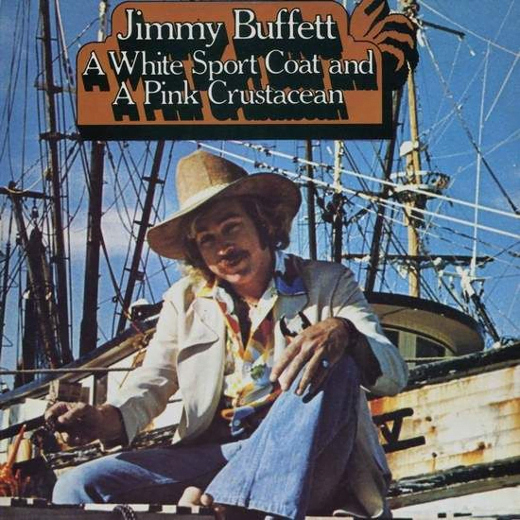
The thing is, this narrative – that here’s where Jimmy found the ocean – is kinda weird when you listen to the opening of the album. It starts with a song that feels like a different kind of experiment in hindsight. The Great Filling Station Holdup is a pretty classic country loser story, some outlaw country, but the outlaws in question are idiots who suck and get caught immediately. It’s a funny song, singable, and it’s also pleasantly brief. It matches with a later song on the album, The Peanut Butter Conspiracy, which talks about how Jimmy used to shoplift when he was poor. It’s kind of fun when Jimmy talks about ‘crime’ that centers himself because even his fictional crimes aren’t cool. They’re just dorky.
The followup, Railroad Lady is a really old, classic style song, made by Jimmy and Jerry Jeff Walker, the writer of the song Mr Bojangles. It’s again, experimental; this isn’t a song about the ocean and easygoing life. It’s talking about the death of the railroad and how it was possible to literally live on them, about how there was this whole wandering lifestyle that worked in such a strange way. This song is like a little serving on the A side for what closes the B side: there are some introspective, sad-sounding songs about winding down.
Jimmy writes about being old and tired and settling down, but it’s pretty worth noting that this album came out when he was twenty seven, so, you know, pump the brakes there Jimbleson Buffettersville.
Then there’s He Went To Paris, a song told in hindsight. It’s a pretty typical kind of country song – the old man sitting and crying and talking about what’s gone. But it’s a song that reaches its arms so wide, talks of travel so far, and uses (for example) the steel drums as a sort of long, soft weeping of the story. It’s beautiful and it’s sad, and it winds its way around to the beach, and paints a sort of future that Jimmy seemingly has decided to grow into. It’s not at all a unique song, there are so many like it, but none of the ones like it feel the same, to me. You can find dozens of country songs about old men reflecting on their lives. You can’t find many that feel as perfect as this.
Grapefruit, Juicy Fruit is the hit from this album, which I don’t get at all. I mean I’m glad there was a hit so he kept making them, but it’s a song I find infinitely forgettable. It almost feels like a song that’s more about the Coral Reefer band getting to play around with sounds. It’s boopidy doopidy and it’s not bad, I just don’t care.
Cuban Crime of Passage is – okay. So brace here. There’s a yikes. There’s a yikes where the woman central to the story is described as ‘half woman, half child, she drove him half wild.’ That’s pretty yikes. I assume this means she was a grown woman but it’s not the kind of framing I like. Still, I like it, it’s singable, and it does have that little underscore that no matter what goes on in Cuba, the whole life of people is reduced to just footnotes, discarded and forgotten to America. It’s a weird twist in the chorus, honestly, because it’s not like Jimmy seems to be positioning himself as above that.
Why Don’t We Get Drunk (And Screw) is a parody song. It’s meant to be a riff on the whole structure of ‘the love song’ on the radio, and it was part of Jimmy’s standard ongoing beef with the radio, which generally didn’t give him a lot of success. It’s also weird that people seem to now think of it unironically. It’s a song he’s revised a lot, including a kid’s version, Why Don’t We Drink Milk At School. I never heard this one growing up, seems dad was willing to hide this one specific song on a vinyl. It did come at the end of a side, making it easier to sneak away.
Still, it all ends up on the final song, a song that for the longest time I was absolutely convinced was some tragic, true story about Jimmy discovering his brother was a beautiful, amazing poet and wanting to honour him posthumously. It’s not a true story, but it’s a retelling of many true stories, all kind of cooked together. It’s one of my favourite Jimmy songs, and part of what I love about it is that it’s a very singable version of the kind of song it is. It’s sad and wistful, but that wist doesn’t mean the song breaks down as a song.
I love this album but I love it because it has He Went to Paris and Death of An Unpopular Poet. The janglier, louder, faster stuff I love from Jimmy isn’t on this, and I can honestly take or leave the majority of the remaining songs, but I have fun memories of sitting around with my cousin, uncle, and dad, and singing, together, The Peanut Butter Conspiracy, so it’s always going to hit a soft spot for me.
Good album? Great album? It’s not like any song on it is bad, it’s just that this album has ‘merely’ two amazing songs on it, and those two songs kind of replicate one another, as reflective and mournful stories about unfulfilled goals.
Here’s the Spotify playlist if you’d like to listen to this album.
Story Pile: Highcumberland Jubilee
I love Jimmy Buffett.
I know, I’m not cool.
I’ve mentioned that I grew up in a media bubble. This space was one where I couldn’t really buy new albums, and my exposure to pop music was little snippets of music from – I kid you not – television ads for compilation albums of ‘the hottest songs of the’ etcetera. When I started engaging with pop music, it wasn’t the pop music aimed at me, it was the pop music that’d been aimed at my dad, because in our secret cupboard, we had hidden away, vinyl records of satanic, dangerous, wild music, like The Eagles and The Moody Blues.
Dad also owned every Jimmy Buffett album, in some form or another, from High Cumberland Jubilee through to Coconut Telegraph, mostly on old vinyl, and once, he tasked me to record all his vinyl onto tape so he could listen to it in the car. I took to this task, and while I was at it, I made recordings for myself, to listen to in my room. They anchored to my soul, singable music that I listened to over and over again, and became my bedrock for learning such ridiculous ideas as fictional narrative in music.
I’ll restate that: Jimmy Buffett is the place I realised that stories in songs can be fake.